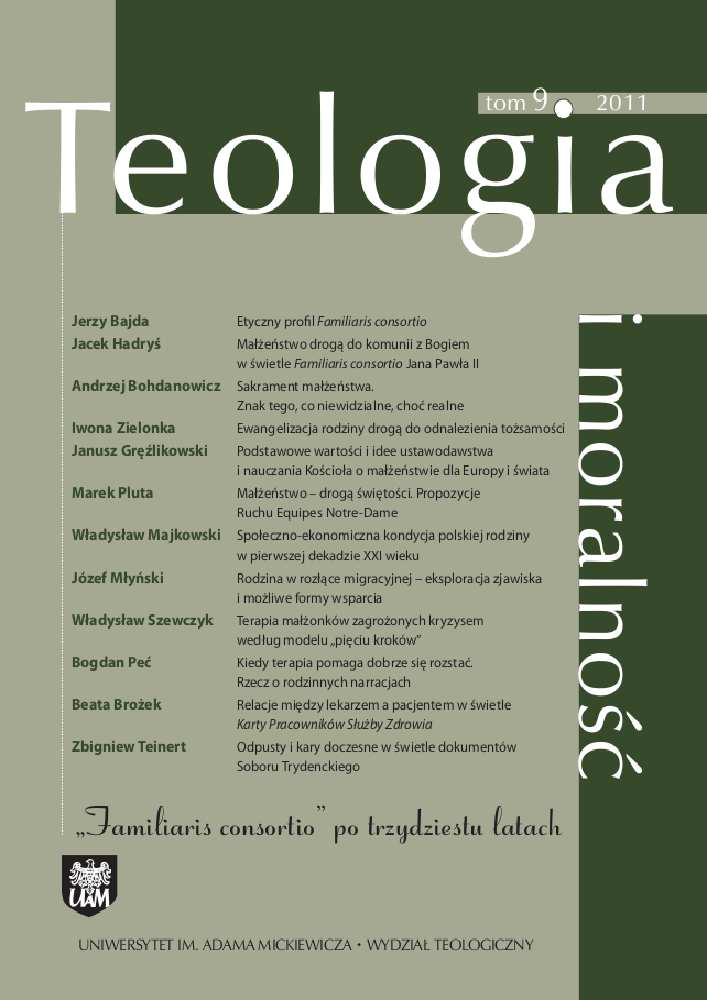Abstract
John Paul II in Familiaris consortio p. 17, when speaking about the tasks of the Christian family, indicates the need to reach out to „the beginning" of the creative act of God. Today it appears that what the family needs above all is re-evangelization. This is to be understood as rediscovering God's original plan for marriage and the family and returning „to the beginning" with faith as a way of life. It is about bringing humans to a personal relationship with God Personality. Today the family is affected by many illnesses. So what can be done to „heal" it? What is the cure? Programs alone are insufficient, similarly as mere pastoral and catechetical instruction, which become like building a house without foundations. Today we have the problem of people practicing religion, but in fact being unbelievers. In addition to the methods developed over the centuries, there is an urgent need for the ministry of exorcists, spiritual liberation from slavery, which affects more and more people, and spiritual discernment on a larger scale. Many of the problems are the causes of spiritual diseases. What is needed is information and formation of priests and lay people, raising awareness about current threats and ways of protecting oneself against them.References
Boadt L., Księga Rodzaju, w: Międzynarodowy Komentarz do Pisma Świętego, Komentarz katolicki i ekumeniczny na XXI wiek, red. W. R. Faarmer, współred. S. Mcvenue. A.J. Levoratti, red. nauk. wyd. pol. W. Chrostowski, współred. T. Mieszkowski, P. Pachciarek, Warszawa 2000-2001.
Clamer A., La Genése (La Saint Bible), Paryż 1951.
Jan Paweł II, Familiaris Consortio, Lublin 1987.
Jan Paweł II, Homilia w czasie Mszy świętej odprawianej przed opactwem OO. Cystersów w Mogile, Kraków – Nowa Huta, 9 czerwca 1979, w: Jan Paweł II, Pielgrzymki do Ojczyzny, Przemówienia, homilie, Kraków 1997.
Jan Paweł II, Mężczyzną i niewiastą stworzył ich, Watykan 1986.
Jan Paweł II, Reconciliatio et paenitentia, Wydawnictwo TUM, Wrocław 1999.
Kiernikowski Z., Eucharystia i jedność, Częstochowa 2000.
Kongregacja Nauki Wiary, Katechizm Kościoła Katolickiego, Wydawnictwo Pallottinum, Warszawa 2002.
Lewek A., Nowa ewangelizacja w duchu Soboru Watykańskiego II, Katowice 1995.
Mierzwiński B., Mężczyzna – mąż – ojciec, Otwock 1996.
Ozorowski E., Zamysł Boży o rodzinie, w: Rodzina na przełomie wieków, red. K. Majdański, Łomianki 2000.
Pryba A., Mężczyzna jako mąż i ojciec. Współczesne wyzwania, w: red. A. Pryba, Rodzina przyszłością świata? W kręgu zamyśleń nad rodziną, Poznań 2009.
Salij J., Cena grzechu, „Dobry Pasterz” 6 (1985).
Sobór Watykański II, Konstytucja duszpasterska o Kościele w świecie współczesnym „Gaudium et spes”.
Szostek A., Cena grzechu: cena zdrady miłości i powrotu do niej, „Dobry Pasterz” 6 (1985).
Ustanowienie Papieskiej Rady ds. Nowej Ewangelizacji. Motu proprio Ubicumque et semper, Radio Vaticana z 12.10.2010.
Wojtyła K., Osoba: podmiot i wspólnota, „Roczniki Filozoficzne” 24 (1976).
Wojtyła K., Uczestnictwo czy alienacja, „Summarium” 7 (1978).
License
All rights reserved
